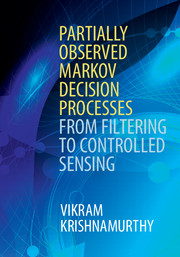Book contents
- Frontmatter
- Contents
- Preface
- 1 Introduction
- Part I Stochastic Models and Bayesian Filtering
- 2 Stochastic state space models
- 3 Optimal filtering
- 4 Algorithms for maximum likelihood parameter estimation
- 5 Multi-agent sensing: social learning and data incest
- Part II Partially Observed Markov Decision Processes: Models and Applications
- Part III Partially Observed Markov Decision Processes: Structural Results
- Part IV Stochastic Approximation and Reinforcement Learning
- Appendix A Short primer on stochastic simulation
- Appendix B Continuous-time HMM filters
- Appendix C Markov processes
- Appendix D Some limit theorems
- References
- Index
5 - Multi-agent sensing: social learning and data incest
from Part I - Stochastic Models and Bayesian Filtering
Published online by Cambridge University Press: 05 April 2016
- Frontmatter
- Contents
- Preface
- 1 Introduction
- Part I Stochastic Models and Bayesian Filtering
- 2 Stochastic state space models
- 3 Optimal filtering
- 4 Algorithms for maximum likelihood parameter estimation
- 5 Multi-agent sensing: social learning and data incest
- Part II Partially Observed Markov Decision Processes: Models and Applications
- Part III Partially Observed Markov Decision Processes: Structural Results
- Part IV Stochastic Approximation and Reinforcement Learning
- Appendix A Short primer on stochastic simulation
- Appendix B Continuous-time HMM filters
- Appendix C Markov processes
- Appendix D Some limit theorems
- References
- Index
Summary
This chapter discusses multi-agent filtering over a graph (social network). We consider online reputation and polling systems where individuals make recommendations based on their private observations and recommendations of friends. Such interaction of individuals and their social influence is modeled as Bayesian social learning on a directed acyclic graph. Data incest (misinformation propagation) occurs due to unintentional reuse of identical actions in the formation of public belief in social learning; the information gathered by each agent is mistakenly considered to be independent. This results in overconfidence and bias in estimates of the state. Necessary and sufficient conditions are given on the structure of information exchange graph to mitigate data incest. Incest removal algorithms are presented. The incest removal algorithms are illustrated in an expectation polling system where participants in a poll respond with a summary of their friends’ beliefs.
This chapter differs from previous chapters in that we focus on the structure of the Bayesian update and information structures rather than numerical computation.
Social sensing
We use the term social sensor or human-based sensor to denote an agent that provides information about its environment (state of nature) on a social network after interaction with other agents. Examples of such social sensors include Twitter posts, Facebook status updates and ratings on online reputation systems like Yelp and TripAdvisor. Online reputation systems (Yelp, TripAdvisor) can be viewed as sensors of social opinion – they go beyond physical sensors since user opinions/ratings (such as human evaluation of a restaurant or movie) are impossible to measure via physical sensors.
Devising a fair online reputation system involves constructing a data fusion system that combines estimates of individuals to generate an unbiased estimate. This presents unique challenges from a statistical signal processing and data fusion point of view. First, humans interact with and influence other humans since ratings posted on online reputation systems strongly influence the behavior of individuals. (For example, a one-star increase in the Yelp rating maps to five- to nine-percent revenue increase [228].) This can result in correlations introduced by the structure of the underlying social network. Second, due to privacy concerns, humans rarely reveal raw observations of the underlying state of nature. Instead, they reveal their decisions (ratings, recommendations, votes) which can be viewed as a low resolution (quantized) function of their belief.
- Type
- Chapter
- Information
- Partially Observed Markov Decision ProcessesFrom Filtering to Controlled Sensing, pp. 93 - 118Publisher: Cambridge University PressPrint publication year: 2016



